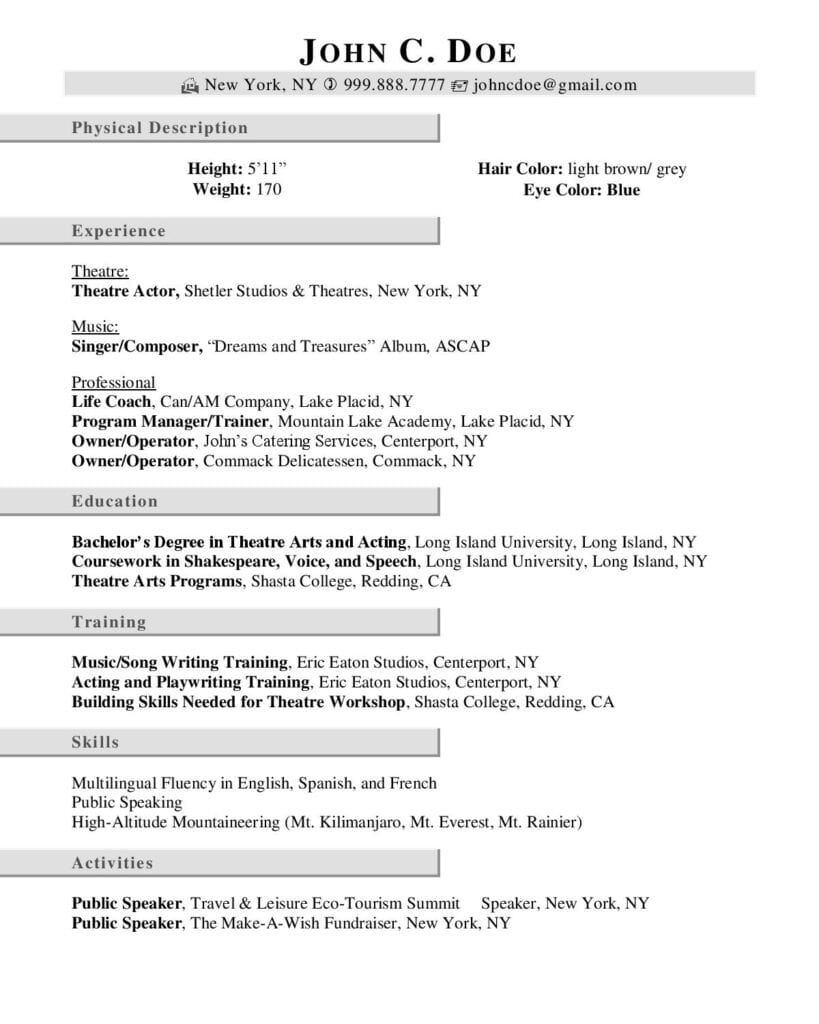Is receiving an Academy Award coupled with a standing ovation for an acting role your childhood dream? Don’t feel discouraged; you can still make your dream come true. If you are an experienced actor or an auditionee trying your luck in pursuing an acting career, submitting a professional-looking acting resume when you audition for the role increases your chances of landing the part. If you’re just starting out to build your career, lack of experience will place you into a disadvantageous position.
Despite these challenges of creating an acting resume, knowing how to present your unique skills, experience, and training will make casting directors see you as the best fit for the role. Let us help you show your strong suit and learn how to write an acting resume that reveals more than your experience.

What is an Actor’s Resume?
Along with an actor’s headshot, an acting resume or actor’s resume is your ticket to closing a project and, eventually, to stardom. Aside from your experience and past works, it also shows off the education, training, and special skills you have under your belt.
But if you lack experience, what else can you flaunt? How do you make an actor resume? Before we can answer these questions, we first need to establish why you would need one.
For actors with a lesser experience like you, your resume’s purpose is to show that you’re serious about your craft and you’re a capable actor. If you haven’t had your acting break yet, then you can focus more on your experience in student films, theater, workshops, and acting classes. Doing this will let agents and casting directors see that you’ve been acting for years now and you’re not a complete rookie.
What to Add in an Acting Resume Template?
Acting resumes are specialized job tools that limit your resume to only one page and must include an actor’s headshot. Use plain paper (white, light cream, or pale gray) and standard font. Set text size to 10-12 points for the body.
Properly format your resume to make it more inviting and readable. Your resume should be 8×10 in inches. Make sure that the size of your headshot is 8×10 as well, since you’ll have to staple your headshot at the back page.
When writing your actor’s resume, be sure to make it relevant to the role you are auditioning for. Never lie on your resume. A damaged reputation would be the last thing you’d want before your debut.


Download a copy of this acting resume example.
How to Make an Acting Resume?
Committed to helping you land your dream job, we here at Resume Professional Writers would like to help you in crafting the best acting resume. In this video, we will show you how to write an actor resume to help you land more auditions. Also, you’ll have an idea how to describe your experience on a resume.
Header Section
Stage name. Type your stage name in a large bold font at the very top of your resume.
Union affiliations. Under your name, list your professional affiliations such as SAG-AFTRA, AEA, or AGMA. If you’re not a union member, omit this part.
Contact info. Don’t include your home address and phone number. Just list your website URL or your agent’s mobile number and email address.
Physical description. List your current height, weight, eye color, and hair color. Your shoe and clothing sizes are optional. No need to include your birthdate and age unless you’re a minor.
Experience Section
Sort your acting credits by sector such as film, theater, and commercial. Don’t worry about chronological order and list the most applicable type first.
In each entry, add related projects, company names, and your roles (even how small they may seem). Show them you know what is expected of you.
Training Section
In this section, you need not list everything you’ve learned. Include only those that relate to acting such as the classes you completed.
It’s best to specify the acting class you took and the name of your instructor. A few acting classes you can take are scene study, improvisation, and cold reading.
Special Skills
Casting directors look for specific skills and talents based on the project. Classify your skills by type: voice and speech, music, dance, combat and weaponry, athletics, circus, vehicles, teaching, and miscellaneous.
You can also add accents, dialects, and skills that have won you accolades. Who knows? If you can read medical terms, you may get a role in a medical television series like Grey’s Anatomy.
Never Stop Auditioning
Imagine, the next role you land could be your biggest break! And if you must invest in a professional photo, shouldn’t you hire an expert resume writing service to create your acting resume, too? Be the next Oscar winner!












